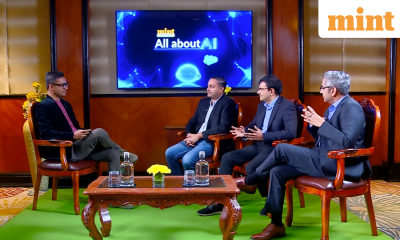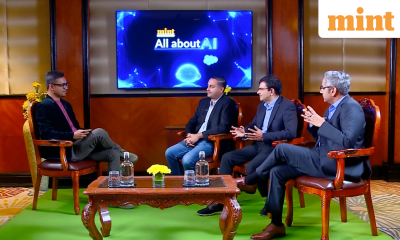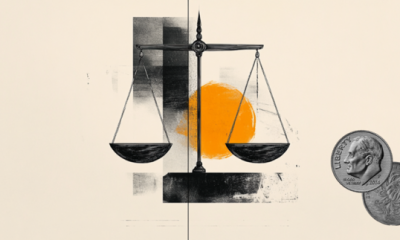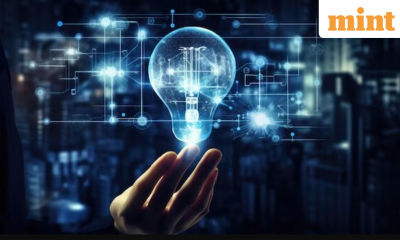
Metaverse
How worried should you be about AI disrupting elections? – Crypto News
Politics is supposed to be about persuasion; but it has always been stalked by propaganda. Campaigners dissemble, exaggerate and fib. They transmit lies, ranging from bald-faced to white, through whatever means are available. Anti-vaccine conspiracies were once propagated through pamphlets instead of podcasts. A century before covid-19, anti-maskers in the era of Spanish flu waged a disinformation campaign. They sent fake messages from the surgeon-general via telegram (the wires, not the smartphone app). Because people are not angels, elections have never been free from falsehoods and mistaken beliefs.
But as the world contemplates a series of votes in 2024, something new is causing a lot of worry. In the past, disinformation has always been created by humans. Advances in generative artificial intelligence (AI)—with models that can spit out sophisticated essays and create realistic images from text prompts—make synthetic propaganda possible. The fear is that disinformation campaigns may be supercharged in 2024, just as countries with a collective population of some 4bn—including America, Britain, India, Indonesia, Mexico and Taiwan—prepare to vote. How worried should their citizens be?
It is important to be precise about what generative-AI tools like ChatGPT do and do not change. Before they came along, disinformation was already a problem in democracies. The corrosive idea that America’s presidential election in 2020 was rigged brought rioters to the Capitol on January 6th—but it was spread by Donald Trump, Republican elites and conservative mass-media outlets using conventional means. Activists for the BJP in India spread rumours via WhatsApp threads. Propagandists for the Chinese Communist Party transmit talking points to Taiwan through seemingly legitimate news outfits. All of this is done without using generative-AI tools.
What could large-language models change in 2024? One thing is the quantity of disinformation: if the volume of nonsense were multiplied by 1,000 or 100,000, it might persuade people to vote differently. A second concerns quality. Hyper-realistic deepfakes could sway voters before false audio, photos and videos could be debunked. A third is microtargeting. With AI, voters may be inundated with highly personalised propaganda at scale. Networks of propaganda bots could be made harder to detect than existing disinformation efforts are. Voters’ trust in their fellow citizens, which in America has been declining for decades, may well suffer as people began to doubt everything.
This is worrying, but there are reasons to believe AI is not about to wreck humanity’s 2,500-year-old experiment with democracy. Many people think that others are more gullible than they themselves are. In fact, voters are hard to persuade, especially on salient political issues such as whom they want to be president. (Ask yourself what deepfake would change your choice between Joe Biden and Mr Trump.) The multi-billion-dollar campaign industry in America that uses humans to persuade voters can generate only minute changes in their behaviour.
Tools to produce believable fake images and text have existed for decades. Although generative AI might be a labour-saving technology for internet troll farms, it is not clear that effort was the binding constraint in the production of disinformation. New image-generation algorithms are impressive, but without tuning and human judgment they are still prone to produce pictures of people with six fingers on each hand, making the possibility of personalised deepfakes remote for the time being. Even if these AI-augmented tactics were to prove effective, they would soon be adopted by many interested parties: the cumulative effect of these influence operations would be to make social networks even more cacophonous and unusable. It is hard to prove that mistrust translates into a systematic advantage for one party over the other.
Social-media platforms, where misinformation spreads, and AI firms say they are focused on the risks. OpenAI, the company behind ChatGPT, says it will monitor usage to try to detect political-influence operations. Big-tech platforms, criticised both for propagating disinformation in the 2016 election and taking down too much in 2020, have become better at identifying suspicious accounts (though they have become loth to arbitrate the truthfulness of content generated by real people). Alphabet and Meta ban the use of manipulated media in political advertising and say they are quick to respond to deepfakes. Other companies are trying to craft a technological standard establishing the provenance of real images and videos.
Voluntary regulation has limits, however, and the involuntary sort poses risks. Open-source models, like Meta’s Llama, which generates text, and Stable Diffusion, which makes images, can be used without oversight. And not all platforms are created equal—TikTok, the video-sharing social-media company, has ties to China’s government, and the app is designed to promote virality from any source, including new accounts. Twitter (which is now called X) cut its oversight team after it was bought by Elon Musk, and the platform is a haven for bots. The agency regulating elections in America is considering a disclosure requirement for campaigns using synthetically generated images. This is sensible, though malicious actors will not comply with it. Some in America are calling for a Chinese-style system of extreme regulation. There, AI algorithms must be registered with a government body and somehow embody core socialist values. Such heavy-handed control would erode the advantage America has in AI innovation.
Politics was never pure
Technological determinism, which pins all the foibles of people on the tools they use, is tempting. But it is also wrong. Although it is important to be mindful of the potential of generative AI to disrupt democracies, panic is unwarranted. Before the technological advances of the past two years, people were quite capable of transmitting all manner of destructive and terrible ideas to one another. The American presidential campaign of 2024 will be marred by disinformation about the rule of law and the integrity of elections. But its progenitor will not be something newfangled like ChatGPT. It will be Mr Trump.
For subscribers only: to see how we design each week’s cover, sign up to our weekly Cover Story newsletter.
© 2023, The Economist Newspaper Limited. All rights reserved. From The Economist, published under licence. The original content can be found on www.economist.com
-

 Blockchain7 days ago
Blockchain7 days agoThe Quantum Clock Is Ticking on Blockchain Security – Crypto News
-

 Technology1 week ago
Technology1 week agoHow Americans are using AI at work, according to a new Gallup poll – Crypto News
-

 Technology1 week ago
Technology1 week agoHow Americans are using AI at work, according to a new Gallup poll – Crypto News
-

 Blockchain1 week ago
Blockchain1 week agoTether Launches Dollar-Backed Stablecoin USAT – Crypto News
-

 Metaverse4 days ago
Metaverse4 days agoContext engineering and the Future of AI-powered business – Crypto News
-

 Cryptocurrency1 week ago
Cryptocurrency1 week agoRiver Crypto Token Up 1,900% in the Last Month—What’s the Deal? – Crypto News
-

 Metaverse3 days ago
Metaverse3 days agoStop panicking about AI. Start preparing – Crypto News
-

 others1 week ago
others1 week agoUS Heiress Slaps Billion-Dollar Lawsuit on Banks for Allegedly Aiding the Looting of Her $350,000,000 Trust Fund – Crypto News
-

 Blockchain1 week ago
Blockchain1 week agoTrump-Backed WLFI Snaps Up 2,868 ETH, Sells $8M WBTC – Crypto News
-

 Blockchain1 week ago
Blockchain1 week agoTrump-Backed WLFI Snaps Up 2,868 ETH, Sells $8M WBTC – Crypto News
-

 Blockchain1 week ago
Blockchain1 week agoUS Storm Smashes Bitcoin Mining Power, Sending Hash Rates Tumbling – Crypto News
-

 Metaverse1 week ago
Metaverse1 week agoIs AI eating up jobs in UK? New report paints bleak picture – Crypto News
-

 Cryptocurrency1 week ago
Cryptocurrency1 week agoTrump family-backed American Bitcoin achieves 116% BTC yield – Crypto News
-

 Cryptocurrency1 week ago
Cryptocurrency1 week agoRiver price defies market downturn, explodes 40% to new ATH – Crypto News
-

 Metaverse4 days ago
Metaverse4 days agoContext engineering and the Future of AI-powered business – Crypto News
-

 Metaverse4 days ago
Metaverse4 days agoContext engineering and the Future of AI-powered business – Crypto News
-

 Blockchain1 week ago
Blockchain1 week agoBitcoin Gets the Macro Bug as $87,000 Comes Into Play – Crypto News
-

 Cryptocurrency1 week ago
Cryptocurrency1 week agoMakinaFi hit by $4.1M Ethereum hack as MEV tactics suspected – Crypto News
-

 Technology1 week ago
Technology1 week agoHow Americans are using AI at work, according to a new Gallup poll – Crypto News
-

 others1 week ago
others1 week agoPBOC sets USD/CNY reference rate at 6.9843 vs. 6.9929 previous – Crypto News
-

 Blockchain1 week ago
Blockchain1 week agoKalshi Expands Political Footprint with DC Office, Democratic Hire – Crypto News
-

 Technology1 week ago
Technology1 week agoElon Musk says ‘WhatsApp is not secure’ amid Meta privacy lawsuit; Sridhar Vembu cites ‘conflict of interest’ – Crypto News
-
Technology1 week ago
Fed Rate Cut Odds in January Crash to 99% Ahead of Dollar Yen Intervention- Will BTC React? – Crypto News
-
Cryptocurrency1 week ago
Fed Rate Cut Odds in January Crash to 99% Ahead of Dollar Yen Intervention- Will BTC React? – Crypto News
-

 Blockchain1 week ago
Blockchain1 week agoBitcoin Gets the Macro Bug as $87,000 Comes Into Play – Crypto News
-
Business1 week ago
Bitcoin and XRP Price At Risk As US Govt. Shutdown Odds Reach 73% – Crypto News
-
Business1 week ago
Bitcoin and XRP Price At Risk As US Govt. Shutdown Odds Reach 73% – Crypto News
-
Business1 week ago
Bitcoin Sentiment Weakens BTC ETFs Lose $103M- Is A Crash Imminent? – Crypto News
-
Business1 week ago
Japan Set to Launch First Crypto ETFs as Early as 2028: Nikkei – Crypto News
-

 Cryptocurrency1 week ago
Cryptocurrency1 week agoRYO Digital Announces 2025 Year-End Milestones Across Its Ecosystem – Crypto News
-

 Cryptocurrency1 week ago
Cryptocurrency1 week agoRiver Crypto Token Up 1,900% in the Last Month—What’s the Deal? – Crypto News
-
Business1 week ago
Experts Advise Caution As Crypto Market Heads Into A Bearish Week Ahead – Crypto News
-
Business1 week ago
Experts Advise Caution As Crypto Market Heads Into A Bearish Week Ahead – Crypto News
-

 Blockchain1 week ago
Blockchain1 week ago‘Most Reliable’ Bitcoin Price Signal Hints at a 2026 Bull Run – Crypto News
-
Technology1 week ago
Bitcoin And XRP Price Prediction Ahead of FOMC Meeting Tomorrow, Jan 28 – Crypto News
-
Technology1 week ago
Bitcoin And XRP Price Prediction Ahead of FOMC Meeting Tomorrow, Jan 28 – Crypto News
-
Technology1 week ago
Bitcoin And XRP Price Prediction Ahead of FOMC Meeting Tomorrow, Jan 28 – Crypto News
-
Business1 week ago
Bitcoin Faces Renewed Volatility as Investors Explore Options Like Everlight – Crypto News
-
others1 week ago
Jerome Powell Speech Tomorrow: What to Expect From Fed Meeting for Crypto Market? – Crypto News
-
Technology1 week ago
Fed Rate Cut Odds in January Crash to 99% Ahead of Dollar Yen Intervention- Will BTC React? – Crypto News
-
Business1 week ago
Bitcoin and XRP Price At Risk As US Govt. Shutdown Odds Reach 73% – Crypto News
-
others1 week ago
U.S. Shutdown Odds Hit 78% as CLARITY Act Faces Fresh Uncertainty – Crypto News
-

 others1 week ago
others1 week ago478,188 Americans Warned After Hackers Strike Government-Related Firm Handling Sensitive Personal Data – Crypto News
-
Technology1 week ago
Crypto Events to Watch This Week: Is the Market Entering a New Recovery Phase? – Crypto News
-

 Blockchain1 week ago
Blockchain1 week agoCZ Won’t Return to Binance, Bullish on Bitcoin Supercycle – Crypto News
-

 Blockchain1 week ago
Blockchain1 week agoSolana (SOL) Slips Further As Bears Target Deeper Support Zones – Crypto News
-

 Technology1 week ago
Technology1 week agoIs TikTok still down in the United States? Check current status – Crypto News
-

 Cryptocurrency1 week ago
Cryptocurrency1 week agoThe productivity bull case for almost everything – Crypto News
-
Business1 week ago
Experts Advise Caution As Crypto Market Heads Into A Bearish Week Ahead – Crypto News
-
Technology1 week ago
Bitcoin And XRP Price Prediction Ahead of FOMC Meeting Tomorrow, Jan 28 – Crypto News


















